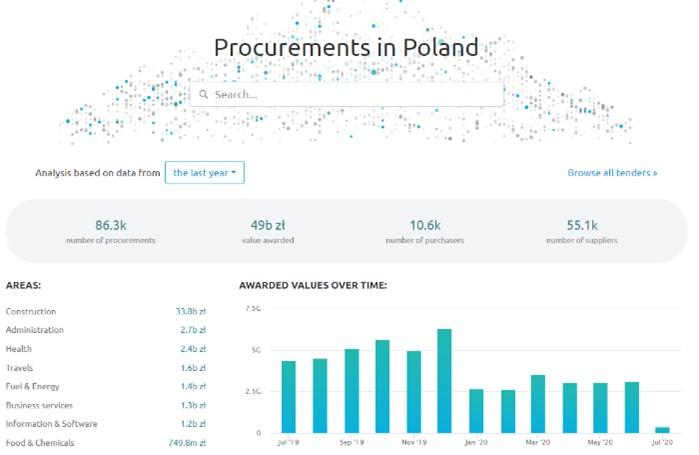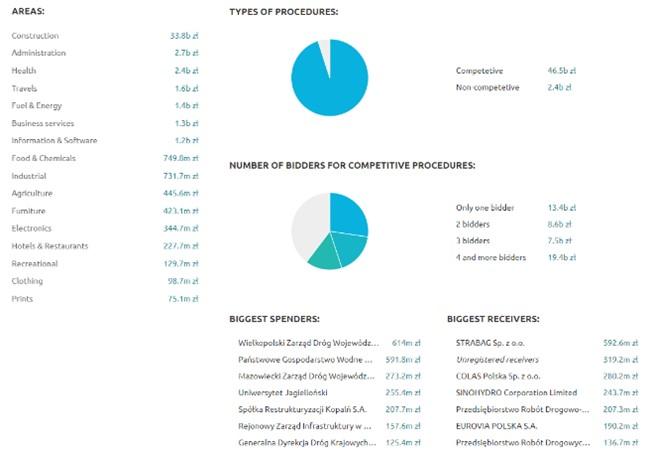Country: Hungary, Poland, Romania, Spain
Practice category: Systems and tools
Contact: E-Panstwo Foundation
Website: www.tenders.guru/
Email:monika [dot] kajalidis epf [dot] org [dot] pl (monika[dot]kajalidis[at]epf[dot]org[dot]pl)
epf [dot] org [dot] pl (monika[dot]kajalidis[at]epf[dot]org[dot]pl)
Fraud risk(s) countered:
• Avoidance or manipulation of public procurement procedures

Context and objective(s)
|
The RECORD project (REducing COrruption Risks with Data) aims to reduce corruption risk by analysing both EU and national level public procurement processes and tackling inefficient spending of public funds. RECORD is funded by the European Union and coordinated by five NGOs based in four European countries: Hungary, Poland, Romania, and Spain. The project partners for RECORD have an established cooperation prior to the project and have found themselves facing similar issues in public procurement. There is currently no standard format in which procurement data should be published. This, coupled with the lack of strict, extensive rules on what has to be published and how means that currently, the format and accessibility of public procurement data varies greatly across Europe, leading to varied formats, templates and gaps in data sets, thus creating barriers for data analysis and reuse. In addition to this, much emphasis is placed on above-the-threshold procurement, with insufficient guidance on how to reduce corruption risks where spending is lower, particularly at the regional and local level. The partners came up with the idea to create a project that would analyse the public procurement data in countries that have different regulatory, geographical and fraud environments. Project activities include assessment of institutional capacities and national regulation in order to develop a toolkit that can be used by policymakers, civil society organisations, and journalists alike to monitor procurements and to identify corruption risks. This monitoring tool will be made available for use in other Member States, providing EU members with a free, open-source tool to support legal and practical measures and as well as advocacy to combat corruption. The project will develop a series of recommendations for policy makers and legislators in local and national governments and for the EU on the legal framework for public procurement, beneficial ownership, access to information, monitoring of EU funds, and protection of whistle-blowers.
|
Description of the practice
|
The main aim of the RECORD project is to provide a trustworthy and detailed data analysis of the public procurement databases to inform better policy making. The primary market group for the tool is not public authorities as such, but rather NGOs, researchers and investigation journalists. The ultimate goal of the project is to inform the changes to national legislations and the EU Directive on more efficient and transparent public procurement. The project is implemented by four partners: Access Info Europe (Spain), Civio (Spain), ePaństwo Foundation (Poland), Funky Citizens (Romania), and K-Monitor (Hungary). The project activities focus on:
 
Source: www.tenders.guru The data analytics tool Tenders GURU (www.tenders.guru) developed by the project allows user to investigate additional layers of information, and like “peeling an onion” investigate procurement cases and compare them between countries. The data analytics tool is still under development and is planned to be fully functional by March 2021. It is planned that the existing public procurement data will be cleaned and structured, allowing users to browse several categories of indicators:
The tool as such does not produce red flags, but provides cleaned up data and analysis of public procurement procedures that could be used for the identification of red flags. The data provided by the website allows for application of many risk indicators, such as: Public procurement procedure: unusual split of contract, awards below the threshold, tailored specifications, few bids, lack of bidders, call for tender not published in official journal, procedure type, cancelled procedure re-launched subsequently, short notice. Bidders: competitor established right before procurement, company has a high ratio of contracts within sector / at a contracting authority, business similarities, bidders have close ties to each other. Evaluation of bids: different evaluation criteria, BEC members that are under pressure, cross check with data on complaints, disputes, court decisions, winning bid is poorly substantiated, unreasonably high bid prices by losing bidders, exclusion of all but one bid. Procurement trends: discrepancies in delivery, bidders take turns winning, anomalies around bids, increase in contract value. Further improvement of the tool might include linking to the company register (depending on the data availability and data quality, now possible only for Poland). |
Unique features
e-Panstwo Foundation names several unique features of Tenders GURU tool:
- Clean data. Compared to other similar initiatives, Tenders GURU is based on cleaned machine-readable data. Cleaned data allows for trustworthy and reliable filters and data analysis as well as a profound level of data complexity.
- Number of filters. Tenders GURU is providing much more filtering options than other similar initiatives due to the clean and structured data.
- Open-source code. Once the tool is finalised and tested, the project team will provide it free of charge as an open source solution. This can allow the authorities and NGOs from other countries to use the algorithms and codes for their public procurement data.
Outcomes and results
- Tenders GURU portal does not collect statistics on users of the portal or how the data helped to detect fraudulent cases
- The data collected by the portal allowed for spot specific irregularities related to trends in public procurement, specific manners of procurement by country or region. However, a further dialogue with public administration is needed to explain such data irregularities.
- The project team observed low interest of public administration in using the tool. Moreover, there is a certain level of reluctance from the public administrations in some countries to use the tool and release more information on public procurement.
Key success factors
- The team for the project has a clear division of competences and roles. The current team includes the following competence profiles:
- Lawyer with a good knowledge of public procurement regulation and with good analytical skills;
- Journalists who are able to train other users on how to use the data on the Tenders GURU portal, but also write investigative articles themselves, based on the data provided by the portal;
- IT programmers working on the source code and website development. For the Tenders GURU project, the IT team is internal and not outsourced;
- Communication team focusing on dissemination and promotion of the project results;
- General administration, financial management teams.
Challenges encountered & lessons learned
- During the testing the tool to clean the data on public procurement, the project team has found several technical issues in four countries. These were related to the lack of consistency in CPV codes, various manual mistakes when inputting numerical data on spenders and receivers of funds.
- Based on the different realities of collecting and structuring the data in different countries, the project team had to change the data collection and data cleansing approach based on the country in order to capture the national specifics.
- The project team notes that’s the data itself is not sufficient for efficient anti-fraud activities. It should be combined with effective capacity building. For instance, during the COVID-19 crisis, the lack of public procurement for emergency procurement can be seen as fraudulent but is in line with specific regulation that might not be known to all users.
- The organisations that would like to introduce similar tools to Tenders GURU should have a good knowledge of available data and technologies. However, one should be flexible and ready to adjust one’s approach and methodology, as issues and unexpected data complexity are common.
Potential for the transferability
There are two main conditions for successful transferability of Tenders GURU practice to other countries:
- A good understanding of national regulation and laws. The local and national context can significantly influence the data on public procurement, therefore good understanding of the legislative basis can help better understand, clean and structure data.
- Thorough analysis of data availability, its quantity and quality. This aspect is crucial to understand how reliable the data is, what indicators can be applied and how to use the results of the analysis.
The Tenders GURU tool is currently available for use in Hungary, Poland, Romania, and Spain. The project team has received the application from Italy to be included in the project, however, the challenges with the assessment of available quality of data does not allow to add Italy to the project at this stage.
Once finalised, the free and open-source nature of the Tenders GURU portal will allow easy transferability of the practice to other countries, considering that the conditions to the regulation and data quality are wel thought out. Currently, e-Panstwo Foundation is coordinating the possible transferability of the practice to other countries.
